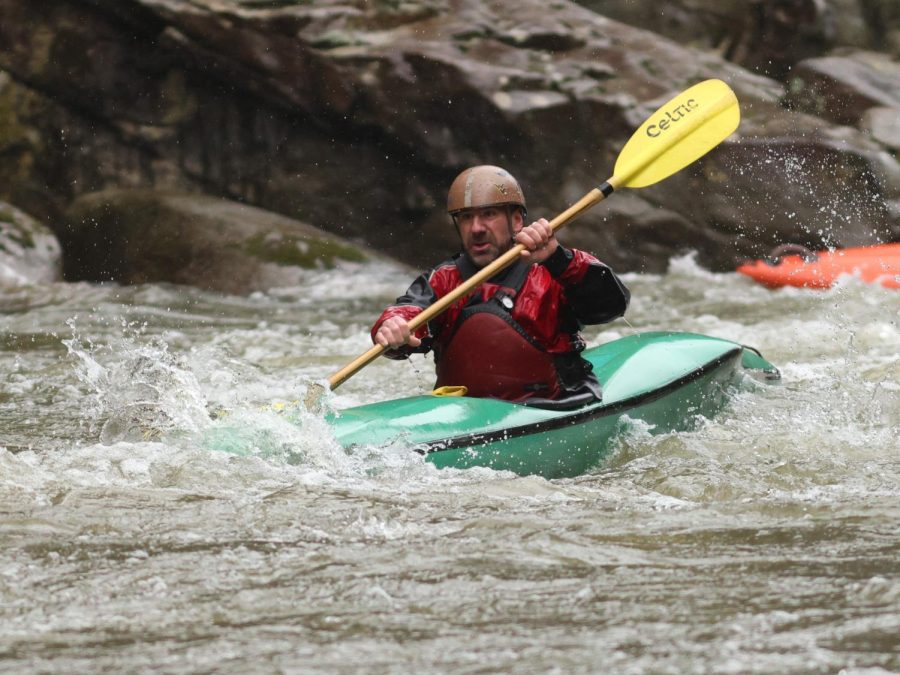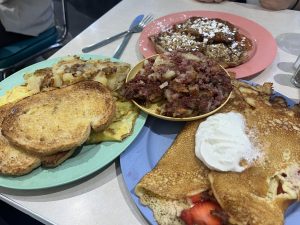Matt Pascal talks about qualifying for the Kayaking World Championships
Photo by Sebastian Foltz
Matt Pascal paddling on Slippery Rock Creek in McConnell’s Mill State Park
April 20, 2022
Teachers have various ways of commuting to work. Professors drive their car, catch an uber or take the bus. However, Dr. Matt Pascal did the unthinkable and kayaked to work one day during finals week last December.
“It was all timing. It was final exams week so based on the schedule, it’s good,” said Pascal. “I found a day that was not windy. Because on the Mon (The Monongahela River) which is what I have to paddle to get here, if it’s windy, it could take me four hours; it would blow my boat sideways.”
Nevertheless, on that day, the conditions were perfect. Everything aligned for kayaking, and Pascal proceeded to kayak on the Monongahela River and made it to and from Point Park in a reasonable amount of time.
On April 10, 2022, Pascal, who is a mathematics professor at Point Park, qualified for the 2022 Kayak World Championships after coming in third at the Wildwater K1 on the Yough River in Ohiopyle. The World Championship event will be held in Treignac, France for the US team from June 3 to June 6.
Although he is proficient at kayaking, his success story didn’t happen overnight. Pascal stepped into a whitewater kayak for the first time in 2003 right after he turned 30. Pascal saw kayakers while in Washington D.C., and they inspired him to pursue kayaking.
“I was living in Washington, DC, near a place called Great Falls, which is on the Potomac River, where there’s a lot of kayaking,” Pascal said. “While hiking, climbing, doing stuff in there, I would see the kayakers, and when I turned 30, I was like, ‘that’s gonna be my new thing. I’m gonna buy all the equipment and figure out how to do this,’ and that was almost 20 years ago now.”
Pascal began kayaking consistently, but he had to swim out of the kayak after it would flip over more often than not when he first started. Nonetheless, the more he practiced, the more he realized kayaking was for him. He then developed a skill called the “eskimo roll,” which is when the kayak flips over, but the kayaker comes back up on the boat without having to swim out. After learning the maneuver, he knew he could take kayaking to the next level.
“For the first six to eight weeks of that year, maybe even longer, I could not roll,” said Pascal. “As soon as you flip over, you’re wearing a skirt, so it’s like sealing your boat so that the water won’t splash and swamp you, but if you flip over, you have to hold a skirt and swim, and it’s a pain in the neck.”
Pascal worked his way up classes in kayaking, and he eventually learned how to paddle in harsh conditions throughout the winter. He can even paddle through snowstorms as long as the water isn’t solid ice.
He continued to work on his craft, and he entered the Stonycreek River Race in Johnstown in 2007. He used a borrowed boat and took second place overall in his first race. After this, he was immediately hooked on the sport.
He began to kayak in not only calm water but raced through rapids as well. When he learned new rivers, he moved to the next and tried to figure out how to kayak through each body of water. However, he scaled back on kayaking on dangerous rivers after one of his close friends drowned in the Blackwater River in West Virginia in 2010. At the time, Pascal was starting a family, so he decided to focus more on racing instead.
“That kind of gravitated me away from the dangerous part of the sport and into the racing part of the sport. There aren’t a lot of people who race, so it was hard to find people. It’s hard to find events,” said Pascal. “But eventually, I found what exists out there in our region … Pittsburgh, Philly and DC essentially are where the races are.”
Pascal excelled at kayaking when he focused on racing. He has finished within the top 10 on seven different occasions, and his success earned him a spot in the Cheat River Race Hall of Fame. The Cheat River Race is the largest mass start whitewater race in the country and in the race, there are 100-200 kayakers at the starting point all racing to get up front before the bottleneck. Pascal raced ahead of the pack and took second place overall last year in the Cheat River Race.
He wasn’t done there as he also took second place in the Upstream Nationals in Ohiopyle, which is a borough in Fayette County in Pennsylvania. The Cheat River Race and the Upstream Nationals are both prestigious events and he realized that if he can compete in these events, he has a shot to compete for a spot at the World Championship.
The National Team Qualifiers were in Ohiopyle, and Pascal wanted the opportunity to compete. Nevertheless, the boat he used was not the one kayakers use in the World Championships. His boat was more controlled, but not as fast. He knew he couldn’t let the opportunity slide, so he went and bought a boat for the qualifiers.
“I found one in DC. Someone was selling for $250. It’s like 40 years old. No joke, it’s literally like 40 years old,” Pascal said. “I had a hard time figuring out how to paddle it, but eventually I got proficient enough at it, so I signed up for the trials.”
Pascal was shocked that he actually had the opportunity to make Nationals. When he races, he says he is racing against the river and the rapids, and not so much the competitors. This hobby he has worked on for almost two decades can now give him a spot in the kayaking world championship event. His decision to race in the qualifiers was an easy one.
“I figured I knew the river, so these folks will be coming in from out of town. Maybe they don’t know the river that well,” said Pascal. “And so it was this past Sunday, and I got third. I did not expect to qualify. They took four. And so I was third. I haven’t got the formal invitation yet, but I know it’s coming.”
He finally reached the pinnacle and will now race in France at the Wildwater K1. He realizes that he needs more preparation as the Wildwater K1 is a lot different than American waters. The event is a downstream race through rapids, but the majority of whitewater kayaking spots around the area are pool drops, which are waters that have mostly calm water and flat water and then one hits a rapid, which is a fast flowing water. The race in France is all rapids, but he is preparing for the challenge on and off the water.
“I hired a strength coach and cardio coach just in the last week because of this, but from what I understand, every minute I can get in this boat is time well spent,” said Pascal. “It’s really the times when I’m unable to get in the boat and train is when I need to then do strength training.”
He realizes that he needs to work on and off water in order to succeed in France, and he has continually improved in kayaking for 19 years.
Overall, kayaking has its ups and downs as it is time consuming. Pascal is a professor and a kayaker, but he also is also a husband and a father of two children. He said it can be a struggle to balance responsibilities with limited time.
“If you ask my wife, she would tell you that I kayak too much. If you ask me, I would say I don’t kayak enough,” Pascal said. “The problem is that getting to the rivers that have whitewater requires a drive. I can go to the nearest one, do some training and come back in four hours minimum. That is the very shortest, and that’s if I hustle, and it’s a short workout.”
He also said that kayaking is not always the safest to do alone, and that is another challenge he often faces. He tries to find kayakers to paddle with when he does take the trip to kayak.
His next challenge is the World Championship in France. Pascal, who is a graduate from Duquesne University and received his PhD at American University, is used to the competition as he was a rower in college.
Although there is competition in kayaking, he loves the sport because there is no pressure. He sees kayaking as something all kayakers enjoy together when racing. Everyone wants a thrill, and everyone enjoys nature that comes along with it. He said the best thing about kayaking is that he doesn’t have to put pressure on himself to do well.
“I know people who will be very upset after a race that they don’t win, or that they don’t place, but I’ve done so many races throughout my life that even if I’m last it’s still a good day,” said Pascal. “It’s still better than work. It still supersedes so much in life that there’s no way I would ever have a race and feel upset after a performance.”
Pascal competes in the Cheat River Race in West Virginia, which is on a tributary on the Monongahela River. He then travels to France on June 3, 2022 to the 2022 World Championship in France and said he can’t wait for the opportunity.





















Janet DeLucia • Apr 20, 2022 at 2:58 PM
Matt is a part of our family. What a great article on his accomplishments!